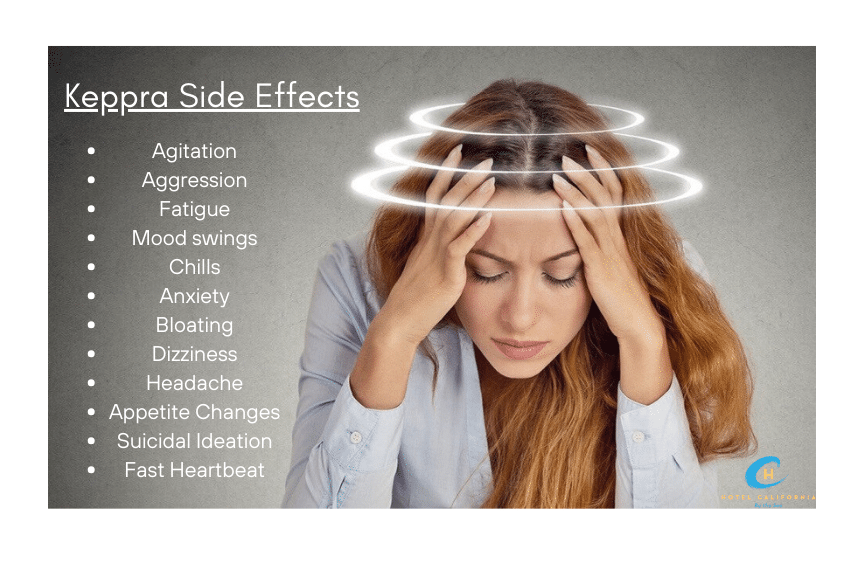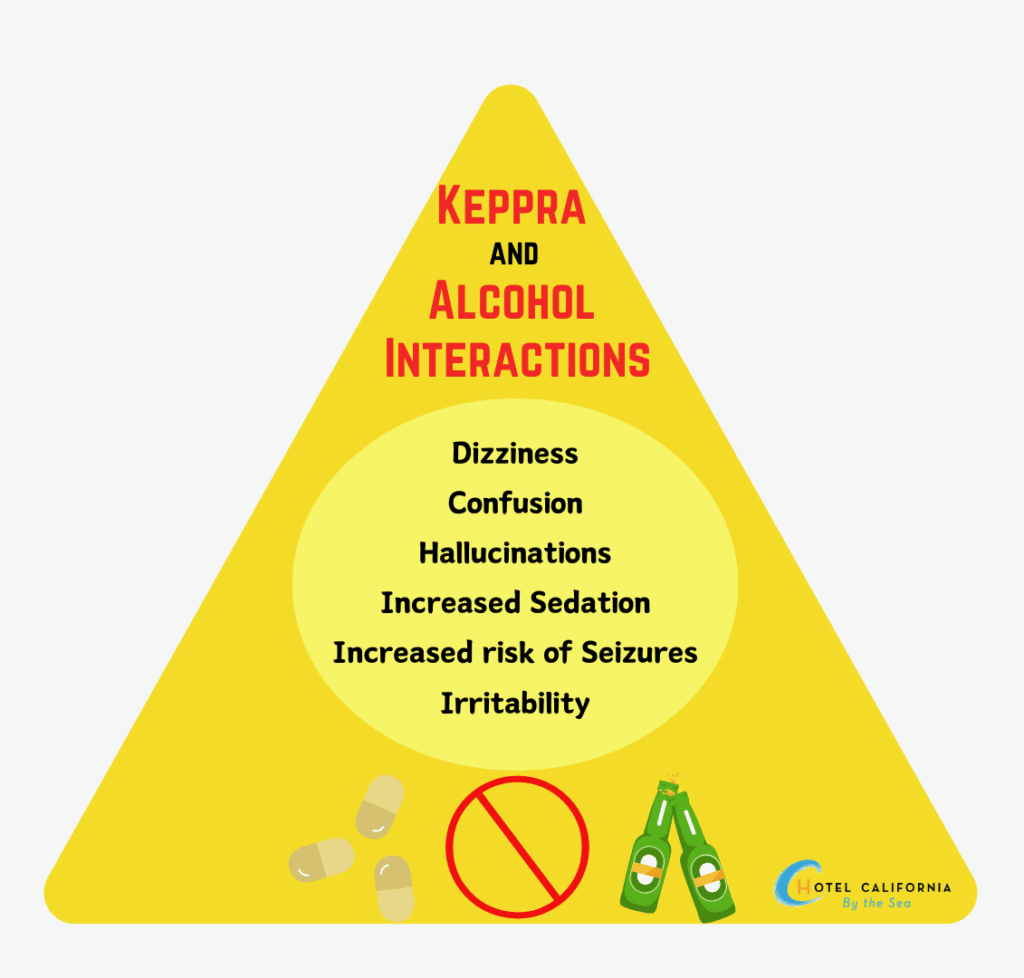What are the Effects of Keppra and Alcohol?
Keppra, also known by its generic name levetiracetam, is an anticonvulsant prescription medication that treats seizures. It is generally prescribed for patients who suffer from epilepsy and can be used in combination with other medications to treat seizures and other similar symptoms. Keppra is used to treat myoclonic epilepsy, temporal lobe epilepsy, focal impaired awareness or complex partial seizures, myoclonic seizures, secondarily generalized seizures and bilateral tonic clonic seizures.

Anticonvulsants work by decreasing and stabilizing abnormal excitement occurring in the brain. The central nervous system is made up of numerous nerve cells that communicate through various electrical signals. When a seizure happens, it is because these nerve cells are not working correctly, firing signals incorrectly or working much faster than normal. The abnormally rapid, repetitive or irregular sending of signals in the CNS causes the brain to become over-stimulated. This causes seizures.
What is Keppra and how does this Anticonvulsant work?
The active ingredient in Keppra is levetiracetam. Seizure medications such as Keppra work by bonding with the SV2A protein. The SV2A protein plays a role in releasing certain neurotransmitters in the brain. These neurotransmitters are responsible for helping to slow down these faulty electrical discharges.

Side Effects of Keppra
- Weakness
- Unsteady walking, loss of balance and coordination
- Decline in cognition
- Confusion
- Aggression and anger
- Headache
- Loss of appetite
- Excessive fatigue
- Joint pain
- Double vision
- Nasal congestion
- Fever
- Signs of infection
- Rash or hives
- Decreased ability to cope with daily tasks
- Development or worsening of depression and anxiety
- Excessive emotional reactions or mood swings
- Increased risk or thoughts of suicide
- Paresthesia
- Adverse reactions such as intense seizures
- Extreme side effects such as psychosis, hallucinations and suicidal thoughts and behaviors affect about 1% of Keppra users
It is not recommended that patients stop taking Keppra without a medical professional’s approval. With anticonvulsant medications, it is important to be taken off gradually in a tapering schedule due to the risks of seizure. The general recommendation for tapering off any anticonvulsant such as Keppra is about 1-3 months.
Keppra and Alcohol
How often are Keppra and alcohol used together? Is the combination safe? What are the effects of using Keppra and alcohol simultaneously? There is always a risk when taking prescription medications in combination with other substances. The risk can be higher with illicit substances. Keppra and alcohol both affect the central nervous system and can heighten each other’s side effects turning mild symptoms into much more severe outcomes.
In some cases, Keppra can be prescribed to treat symptoms of alcohol withdrawal during alcohol use disorder treatment and detox. It is administered as a form of medication management or medication assistance treatment. With excessive alcohol use or heavy drinking, of alcohol can increase the risk of seizures even in a person who is not prone to seizures or has epilepsy. Seizures and delirium tremens can occur during the alcohol withdrawal process and Keppra is often prescribed to help prevent these side effects during detox.
Alcohol is a CNS depressant and slows down brain activity leading to decreased blood pressure and heart rate, sleepiness and delayed reaction time. Alcohol is one of the most commonly occurring types of substance abuse among people of all ages.

Alcohol misuse and addiction can be recognized by the following signs:
- When a person is constantly thinking about alcohol
- When a person is unable to limit or control their alcohol intake
- When a person develops intense mood swings when not taking alcohol
- When a person wants to drink for the sole purpose of getting drunk
- When a person begins lying about drinking alcohol
- When a person allows alcohol to interfere with their responsibilities and obligations
- When a person begins to prioritize alcohol over everything else
With severe alcohol addictions, alcohol withdrawal reverses the effects of physical relaxation and produces distressing symptoms that can include dangerous seizures. When alcohol has been broken down in the body and is in the process of being eliminated, the brain turns this action into an excitatory activity that can lead to muscle spasms, twitching and seizures.
This is due to the body quickly trying to readjust and rebalance itself to function properly without alcohol. This neurological disturbance in the brain causes involuntary muscle movements and behavioral changes. These withdrawal seizures usually begin about 12-48 hours after the last drink. It is most common in chronic and severe alcohol users and does not last for very long. Despite its short-lived nature, it is still very dangerous.
Check Your Insurance Coverage for FREE
Find out if your insurance covers addiction treatment in minutes. We accept most insurance!
Effects of Keppra and Alcohol
Keppra in itself is not considered to be a habit-forming medication. There have been few reported cases of misuse. Many of those rare cases of Keppra misuse also involved the combination of other substances such as alcohol. When taken together, Keppra and alcohol reactions are intensified and users can experience symptoms such as impaired judgment and difficulty concentrating. Other side effects include intense mood swings, suicidal thoughts and behaviors as well as the imbalance of certain brain chemicals leading to feelings of physical sedation.
Common side effects of combined Keppra and Alcohol use
- Extreme dizziness
- Sedation
- Drowsiness
- Lightheadedness
- Impaired judgment and decision-making
- Impaired concentration
- Impaired motor coordination
- Depression
- Increased suicidal thoughts, behaviors and ideation
- Easily bruise
- Easily prone to infections
- Hallucinations
- Shortness of breath
- Altered consciousness
Because of these withdrawal risks, alcohol can be especially dangerous for those who are taking anticonvulsants to manage their epilepsy or seizures. Patients are more likely to have seizures caused by missing a medication dose rather than drinking alcohol.
Reach out to Hotel California by the Sea
We specialize in treating addiction and other co-occurring disorders, such as PTSD. Our Admissions specialists are available to walk you through the best options for treating your addiction.
Treatment for Alcohol Use Disorder
Alcohol use disorder is a common mental health condition that can be treated. During the detox phase of treatment, alcohol withdrawal can be a difficult and dangerous process. With the tools and resources of a professional behavioral treatment program such as Hotel California by the Sea, alcohol detox can be safe and effective. Our alcohol use disorder treatment program utilizes methods such as medication assisted treatments and medication management to help clients overcome their addiction. Oftentimes during the initial detox process, anticonvulsant medication such as Keppra is prescribed to treat seizures that can occur in severe alcohol withdrawal cases.
The combination of the two substances can be dangerous due to its sedative and depressive effects. In cases where it turns into misuse or possibly addiction, our substance abuse treatment program can help clients who have found themselves in a situation where they have become dependent on both Keppra and alcohol. We offer detox, residential and outpatient programs. We also provide specialized treatments such as CBT, DBT and EMDR therapy. Each client will receive a custom care plan suited to his or her recovery needs. We believe there is not one size fits all when it comes to treatment and happily provide the tools and support clients need to overcome their addiction.
References:
https://www.ncbi.nlm.nih.gov/pmc/articles/PMC5759952/
https://www.clearbrookinc.com/news/keppra-and-alcohol-side-effects/
https://welevelupca.com/rehab/keppra-detox/
https://www.guardianrecovery.com/drug-and-alcohol-detox-and-recovery/alcohol-and-keppra/
https://alcoholrehabhelp.org/interactions/drugs-and-alcohol/keppra/
https://www.ncbi.nlm.nih.gov/books/NBK499890/
https://www.epilepsy.com/tools-resources/seizure-medication-list/levetiracetam
https://medlineplus.gov/druginfo/meds/a699059.html
